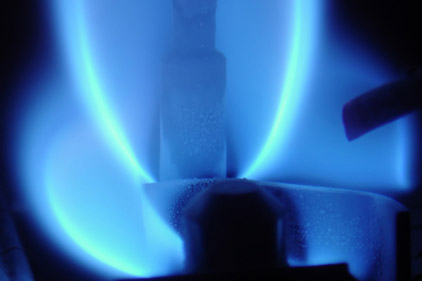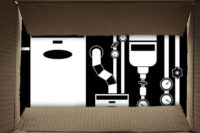“We needed a more efficient steam-generating solution that would improve on the 60% efficiency we were getting from our two 30-yr-old, gas-fueled firetube boilers,” explains Peter Eilskov, maintenance manager of PBC’s Philadelphia location. “As gas prices increased, costs to maintain our 100- and 200-hp boilers increased. As part of PepsiCo’s Performance with Purpose mission - a commitment to deliver sustainable growth by investing in a healthier future for people and the planet - PBC explored energy- and cost-efficient solutions with lower emissions.”
QUICK STARTS NEEDED
After investigating available options, PBC Philadelphia selected a multiple installation of three Miura LX(L)-100SG low-pressure steam boilers. Miura boilers are manufactured in Rockmart, GA and feature Miura’s unique “once-through” fintube design that requires less fuel and generates full steam from a cold start in five minutes or less. This modular on-demand steam capability makes Miura boilers particularly well-suited to a multiple installation (MI) in which boilers can be selectively turned on or off as needed to best manage changing load conditions, as opposed to idling on stand-by while they consume energy and generate emissions. “Our new Miura MI system gets steam instantly up into our lines without a long warm-up wait,” Eilskov says.MONITORING FOR SAVINGS
Miura’s use of advanced computer-control technology ensures optimum boiler efficiency by constantly monitoring multiple boiler components to maintain peak performance. These diagnostics interface with Miura’s ER Monitoring system, an energy dashboard that provides 24/7 status and optimization of boiler operation. In addition to feeding a graphical display on the boilers themselves, the Miura ER Monitoring system also provides Internet connectivity so that full boiler status - including all data, alarms, and troubleshooting information - can be viewed online remotely via PC or a IP-connected mobile device such as a PDA, smart-phone, or a tablet computer.The Miura ER Monitoring system is simple to use. Its screen tells the operator when and why there’s downtime, so operators know what’s going on even before they walk into the boiler room. The technology also provides smart troubleshooting suggestions.
The Miura ER Monitoring system also enables operators to access month-by-month operational data (gas/water usage, emissions), which is handy when submitting the data for local permits.
Miura’s technology also means facilities can conserve on maintenance manpower, because Miura’s ER Monitoring system and computer-control technology maintains optimal levels to ensure equipment gets the pressure and the amount of steam it needs. When it’s not needed, the boilers are on stand-by, so they don’t produce steam. As soon as the demand calls for it, the MI system kicks on, producing steam within a minute or two. It also rotates usage among the three boilers, increasing boiler life.
CONTRACTING FOR MAINTENANCE
Pepsi Beverages Company’s Philadelphia facility is also utilizing Miura’s Maintenance Contract to leverage the manufacturer’s technical support in maintaining optimized boiler performance. In addition to remotely viewing ER Monitoring system data, Miura visits the plant once a month. If the company sees an issue, it will notify the plant immediately. Miura also keeps track of when cleanings are due, letting PBC concentrate on making beverages instead of spending time on support systems.Another measure of optimal boiler performance is the plant’s use of Miura’s eco-friendly BOILERMATE water-treatment program. Perfected over many years in Japan, where Miura boilers were originally developed, the main ingredient of BOILERMATE is silicate, a naturally occurring corrosion inhibitor. Given Miura’s intimate knowledge of boiler technology, BOILERMATE’s chemical composition provides the proper oxidizer and inhibitors needed to prevent scale from building inside of boilers. Miura’s BOILERMATE chemicals are custom-fitted to their boilers.
Another benefit of Miura boilers is the comparatively smaller size, which means customers can replace larger boilers with new Miura boilers with a minimal footprint and minimal piping.
GREEN A PLUS
Economy and convenience aside, Miura boilers also provide a third and increasingly important factor for many corporations and municipalities, which is environmentally friendly green operation. The fintube design saves fuel and produces fewer emissions than conventional boilers. These low-pressure steam boilers are 80% to 85% energy efficient, produce lower plant emissions, and they’re cost-efficient. In fact, during the 2009-2010 calendar year, PBC Philadelphia saved 27% on fuel costs, which amounted to a company savings of over $130,000.Additionally, Miura boilers output reduced levels of nitrogen oxides (NOx), a major contributor to air pollution, as well as CO2, the most prevalent of greenhouse gases. Miura boilers accomplish this by reducing the temperature of the boiler’s flame, which in turn reduces the amount of excited nitrogen atoms available to bond with oxygen to form nitrogen oxides. As a result of this, NOx emissions are reduced to around one-quarter of other traditional options while complying with even the most stringent air quality regulations.ES



